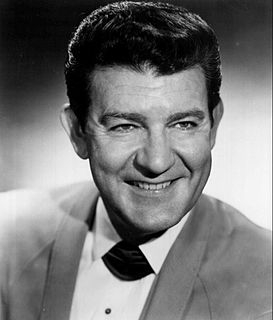
The All-American Rejects are an American rock band formed in Stillwater, Oklahoma in 1999. The band consists of lead vocalist and bassist Tyson Ritter, lead guitarist and backing vocalist Nick Wheeler, rhythm guitarist and backing vocalist Mike Kennerty, and drummer Chris Gaylor. Nick Wheeler and Tyson Ritter are the band's songwriters; Wheeler is the primary composer and Ritter is the main lyricist. Although Kennerty and Gaylor are not founding members of the band, they are generally considered to be original members, appearing in all of the bands' music videos, and on all studio releases - except for the bands' self-titled debut.

Joseph Arrington Jr., better known as Joe Tex, was an American singer and musician who gained success in the 1960s and 1970s with his brand of Southern soul, which mixed the styles of funk, country, gospel, and rhythm and blues.

Sollie Paul "Tex" Williams was an American Western swing musician from Ramsey, Illinois. He is best known for his talking blues style; his biggest hit was the novelty song, "Smoke! Smoke! Smoke! ", which held the number one position on the Billboard charts for sixteen weeks in 1947. "Smoke" was the No. 5 song on Billboard's Top 100 list for 1947, and was No. 1 on the country chart that year. It can be heard during the opening credits of the 2006 movie Thank You for Smoking.

Lula Grace Johnson, known professionally as Jan Howard, is an American country music singer and Grand Ole Opry star. She attained popular success as a country female vocalist during the 1960s and early 1970s and was twice nominated for the Best Female Country Vocal Performance Grammy award. Many of her hits were written by her husband at the time, Harlan Howard.
"The Wayward Wind" is a country song written by Stanley Lebowsky (music) and Herb Newman (lyrics).
"Remember the Alamo" is a song written by Texan folk singer and songwriter Jane Bowers. Bowers details the last days of 180 soldiers during the Battle of the Alamo and names several famous figures who fought at the Alamo, including Mexican general Santa Anna and Texans: Jim Bowie, William Barrett Travis and Davy Crockett. It champions the Texans' efforts against Mexico to establish an independent republic.
This is a list of notable events in country music that took place in 1948.
This is a list of notable events in country music that took place in the year 1946.
This is a list of notable events in country music that took place in the year 1944.
"Smoke! Smoke! Smoke! " is a Western swing novelty song written by Merle Travis and Tex Williams, for Williams and his talking blues style of singing. Travis wrote the bulk of the song. The original Williams version went to number one for 16 non-consecutive weeks on the Hot Country Songs chart and became a number one hit in August 1947 and remained at the top of the "Best Sellers in Stores" chart for six weeks. Recorded on March 27, 1947, at Radio Recorders in Hollywood.
"Someday " is a popular song. It was written by Jimmie Hodges and published in 1944.
"Boll Weevil" is a traditional blues song, also known by similar titles such as "Boweavil" or "Boll Weevil Blues". Although many songs about the boll weevil were recorded by blues musicians during the 1920s, 1930s and 1940s, this one has become well known, thanks to Lead Belly's rendition of it as recorded by folklorist Alan Lomax in 1934. A 1961 adaptation by Brook Benton became a pop hit, reaching number two on the Billboard Hot 100.
"I'm Wastin' My Tears on You" is a song written by Frank Harford, and recorded in 1944 by Tex Ritter. The song was the first of three number ones on the Juke Box Folk records chart. I"m Wastin' My Tears on You" stayed at number one for six weeks with a total of twenty weeks on the chart. The B-side of the song, entitled, "There's a New Moon Over My Shoulder" peaked at number two on the same chart.
"There's a New Moon Over My Shoulder" is a 1944 song written by Jimmie Davis, Ekko Whelan, and Lee Blastic and made popular by Tex Ritter. The song was the B-side to Tex Ritter's, "I'm Wastin' My Tears on You". "There's a New Moon Over My Shoulder" peaked at number two on the Folk Juke Box charts.
"You Two-Timed Me One Time Too Often" written in 1945 by Jenny Lou Carson and performed by Tex Ritter, was the first number one country music hit written by a woman. It was Ritter's second number one on the Juke Box Folk chart, spending eleven weeks at the top and a total of twenty weeks on the chart.
"The Cattle Call" is a song written and recorded in 1934 by American songwriter and musician Tex Owens. It became a signature song for Eddy Arnold. Members of the Western Writers of America chose it as one of the Top 100 Western songs of all time.
"Ain't Gonna Bump No More " was a composition by Joe Tex and Buddy Killen, and released by Tex as a single in 1977, bringing the musician back to the top 40 of the US pop and R&B charts simultaneously for the first time since 1972's "I Gotcha". Tex used his aunt Bennie Lee McGinty's name as composer for tax reasons.




